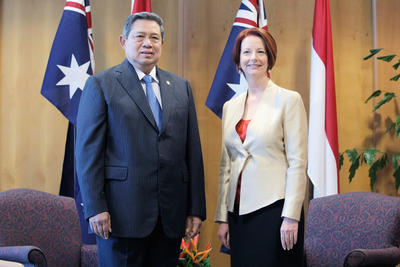
Australian Prime Minister Julia Gillard has named Indonesia as one of five Asian powers that the nation will focus on as she announced a new direction for Australian foreign and economic policy.
In a white paper released on Sunday by Gillard’s government titled "Australia in the Asian Century", Gillard identified China, India, Indonesia, Japan and South Korea as the nation's key partners, citing factors including demography, investment and trade.
"We also have the benefits that come from a track record of engagement with the nations of our region," Gillard said in the 312-page paper.
"Our principal relationships with China, India, Indonesia, Japan and the Republic of Korea [South Korea] have strengthened in recent years. Our alliance with the United States remains as strong as ever [....] Whatever else this century brings, it will bring Asia's rise.
The paper said for Australia to thrive in the Asian century required the nation "to have a clear plan to seize the economic opportunities that will flow and manage the strategic challenges that will arise".
However, experts at the University of Indonesia said that security considerations were evident in the white paper, despite its predominant focus on economic issues.
Hariyadi Wirawan, the head of University of Indonesia's international relations department, said that the paper evinced a clear parallel with US President Barack Obama's "Asia pivot" policy, especially given defence budget cuts.
Although the paper did not dwell on defence, its subtext was countering China's growing influence, Wirawan told The Jakarta Post over the telephone. "Since a meeting between Julia and Obama, there has to be a kind of deal on how to manage things in the Asia Pacific region, with China getting more assertive," he said.
According to Wirawan, the US has been courting Australia as a more significant partner in the region to bolster Western interests in Asia and the Pacific. "This is also a kind of confirmation that the West will not leave the region, leaving [other] nations to face China alone in possible conflicts in the future," he said.
Makmur Keliat, head of the international relations post-graduate programme at the university, agreed, saying that Australia's pivot toward Asia was not done independently and was closely aligned with US policy as part of developing a regional security architecture. "Whoever the US President is, whether Democrat or a Republican, the Pacific has always been considered an inseparable part of the US."
"The US has to be included in any regional integration initiatives in Asia to avoid the bitter experience with the European Union, when the US was left behind," he said.
On Indonesia's options, Keliat said it was important to keep Asean's central role in the region, while Wirawan said that Indonesia should develop a new design to balance its relations with China and the West.
"We cannot follow either one or the other, as we have far greater national interests," Hariyadi said.
The white paper's principal focus was on economic issues, such as boosting Australia's annual per capita income from 62,000 Australian dollar (US$64,311) to 73,000 Australian dollar by 2025, reaffirming that Asia would continue to drive demand for Australia’s energy and mineral resources, and focusing on expansion outside the energy and mining sectors.
Indonesia is Australia's fourth largest trading partner in Asean and 12th largest trading partner overall. Australian investment in Indonesia remained steady in 2011 at $5.4 billion, while Indonesian investment in Australia rose 11 per cent to $454 million.
The white paper also touched regional defence and security ties, saying that: "Cooperative relations among the pre-eminent powers in the region — China, India, Indonesia, Japan and the United States — will be fundamental to regional security and prosperity".
It also stated that: "We accept that China's military growth is a natural, legitimate outcome of its growing economy and broadening interests. It is important that China and others in the region explain to their neighbours the pace and scope of their military modernisation, to build confidence and trust."
Gillard's Asia pivot evoked the efforts of previous prime ministers, notably Bob Hawke and Paul Keating, who also tried to forge stronger ties with Australia's closest neighbours — moves that were quashed by John Howard.
Australia's goals for the Asian Century:
- Boosting per capita income 20 per cent to 73,000 Australian dollar by 2025
- Ensuring more business leaders are "Asia-literate"
- Maintaining strong fiscal position, triple-A sovereign credit rating
- Placing Asian studies at core of school curriculum
- Prioritising learning Mandarin, Hindi, Indonesian and Japanese
- Ensuring 10 Australian universities are in world's top 100 -Asian News Network (October 30, 2012)

No comments:
Post a Comment